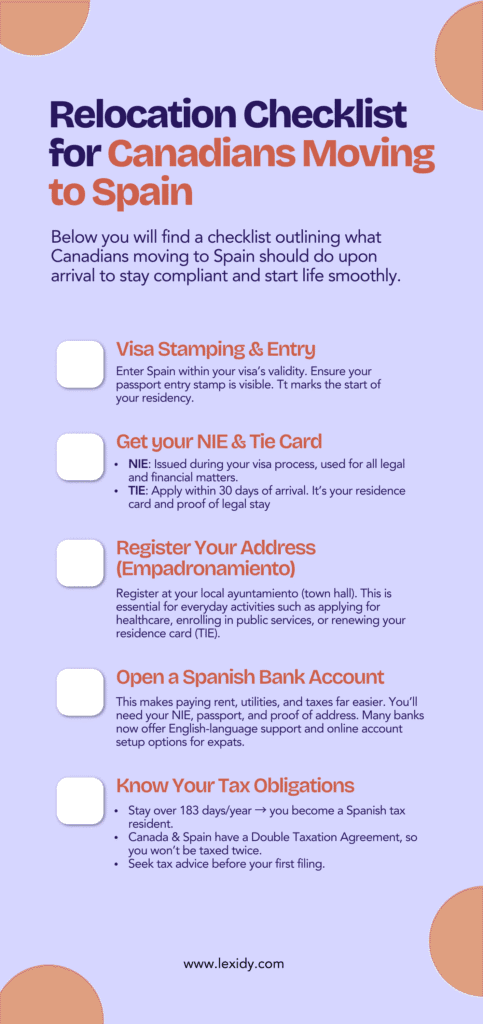Moving to Spain from Canada is a dream for many Canadians looking for more sunshine, affordable living, and a vibrant cultural experience. Whether you are planning to retire, work remotely, or simply enjoy a new lifestyle abroad, Spain offers multiple pathways for Canadians to make this move legally and successfully.
This guide covers the key visa options, compares the cost of living in Spain vs Canada, and highlights the essential steps to settle smoothly. It is designed to give you clarity on how to relocate to Spain with confidence and the right preparation.
Table of Contents
Spanish Visa Options for Canadians
If you’re moving to Spain from Canada, your first step is choosing the right visa. While Canadians can visit Spain for up to 90 days without a visa, staying longer requires a residence permit. The table below outlines the main visa types available to Canadians, along with their key requirements.
| Visa Type | Purpose | Minimum Income Requirement (2025) | Work Rights | Duration & Renewal | Ideal For |
| Non-Lucrative Visa | Live in Spain without working | €2,400/month + €600 per dependent | ❌ Not allowed | 1 year, renewable | Retirees or financially independent Canadians |
| Digital Nomad Visa | Work remotely for a foreign company | €2,762/month + €1,036 for 1st family member + €336 for additional family members | ✅ Remote work only (20% can be provided to local companies or clients) | Up to 3 years, renewable | Remote workers, freelancers and business owners |
| Student Visa | Remote workers, freelancers, and business owners | Around €600/month | ✅ Up to 30 hrs/week if superior studies | Duration of studies (if not superior studies, 1 year, renewable for another year) | Students enrolled in Spanish institutions |
| Work Visa | Employment with Spanish company | Varies by job offer | Employment with a Spanish company | Duration of contract | Professionals with job offers from a Spanish-registered company |
Non-Lucrative Visa (NLV)
The Spain Non-Lucrative Visa is ideal for retirees or financially independent individuals who wish to live in Spain without working.
Key requirements:
- Minimum income: €2,400/month or €28,800/year for the main applicant.
- Add around €600/month for each dependent.
- Comprehensive private health insurance with a company authorized to operate in Spain
- Proof of stable passive income (pension, savings, investments, dividends, rental income… any passive source that can be proved via documentation is acceptable).
- Employment or business activity is not permitted, not even remotely. If you are a company owner, you need to appoint someone to take care of the day-to-day of the business.
This visa is perfect for those who want to retire in Spain from Canada or enjoy an extended stay without employment.
Digital Nomad Visa
The Spain Digital Nomad Visa is designed for Canadians who work remotely for companies or clients outside Spain.
Key requirements (2025):
- Minimum income of €2,762/month (200% of Spain’s Minimum Wage).
- +75% SMI for the first dependent and +25% SMI for each additional one.
- A remote employment or freelance arrangement in place for at least 3 months before applying
- Activity of the company for at least 1 year
- A university degree (bachelor’s or higher) or at least 3 years of relevant professional experience shown via documentation
- The majority of your work must be for non-Spanish clients or companies (up to 20% of your income may come from Spanish sources).
- Private health insurance is generally recommended (especially for family members), and a clean criminal record is requested from the countries you have legally resided in over the past 5 years.
This visa allows you to move to Spain from Canada while working remotely, with residence for up to three years and a pathway to permanent residency and citizenship.
Student Visa
For Canadians pursuing higher education in Spain, this visa allows residence for the duration of your studies – if superior studies you will have a visa granted for the whole duration of the studies (degrees, masters, doctorates, habilitating formative activities for specific regulated jobs…), access to a work permit to up to 30h per week and can also regroup your family here during its validity period.
If the studies are for languages or other non-superior studies, the initial duration of the visa would be 1 year, renewable for just one additional year. In this case, you cannot add your dependent family members nor have direct access to the restricted work permit.
Key requirements:
- Proof of enrollment in a recognized institution.
- Proof of financial means of about €600 a month to support you during your studies, and half of that per each accompanying family member.
- Valid health insurance.
Work Visa
The Spain Work Visa is an option for Canadians who have received a formal job offer from a Spanish employer. It allows full employment rights in Spain, but it is generally more challenging to obtain than other residence visas.
Because of Spain’s labor market protections, your employer must first demonstrate that no local or EU candidate could fill the position. This step, known as the labor market test (situación nacional de empleo), can make the process longer and more complex.
Key Requirements:
- A valid job offer and employment contract from a Spanish company
- Employer sponsorship and labor market approval
- Compliance with Spain’s minimum salary and social security obligations
- Application for a national visa before entering Spain
This visa is typically granted for the duration of your employment contract and can be renewed as long as your work continues in Spain.
Ready to take the next step? Explore all your Spain immigration options and find the right pathway for your move.
Cost of Living and Quality of Life: Spain vs. Canada

When moving to Spain from Canada, one of the biggest advantages is how far your money goes. Even in Spain’s largest cities, the overall cost of living is significantly lower than in Canada.
Below is an average comparison between major and mid-sized cities in both countries, Madrid vs. Toronto and Valencia vs. Montreal, to give you a clearer picture.
| Category | Madrid (Spain) | Valencia (Spain) | Toronto (Canada) | Montreal (Canada) |
| Rent (1BR Apartment (City Center) | €1,100 ($1,782) | €800 ($1,296) | $2,400 | $1,700 |
| Groceries (Monthly) | €300 ($486) | €250 ($405) | $550 | $480 |
| Dining Out (3-Course Meal for 2) | €50 ($81) | €40 ($65) | $110 | $85 |
| Private Health Insurance (Monthly) | €80 ($130) | €60 ($97) | $250 | $200 |
| Public Transport Pass (Monthly) | €40 ($65) | €35 ($57) | $156 | $100 |
| Average Net Salary | €2,200 ($3,564) | €1,800 ($2,916) | $4,800 | $4,000 |
Sources: Numbeo, Expatistan, and LivingCost.org (2025 data). All Spanish prices in euros (€) with CAD conversion in parentheses. Exchange rate: €1 = 1.62 CAD.
A lifestyle that costs around $4,200 CAD in Toronto would cost roughly $2,900 CAD in Madrid or $2,400 CAD in Valencia, a difference of about 40–45%.
A Better Quality of Life
Beyond the financial advantage, Spain consistently ranks higher in quality-of-life indexes thanks to its Mediterranean climate, social culture, and slower pace of life. Locals prioritize community, leisure, and outdoor living, with over 300 days of sunshine a year in many regions.
Whether you’re seeking city vibrancy in Madrid or a more relaxed coastal life in Valencia, Spain offers a safe, welcoming environment that appeals to professionals, digital nomads, and retirees alike.
The Relocation Checklist for Moving to Spain from Canada

Once your visa is approved, it’s time to handle a few important steps to complete your move. This checklist outlines what Canadians moving to Spain should do upon arrival to stay compliant and start life smoothly.
1. Visa Stamping & Entry
After receiving your approved visa, you’ll need to enter Spain within the validity period shown in your passport. Make sure your entry stamp is clearly visible, as it confirms the official start of your residence period.
2. Get Your NIE and TIE Card
The NIE (Número de Identificación de Extranjero) is your foreigner identification number used for all legal, financial, and administrative matters in Spain that will be granted to you within the permit/visa application process.
Once in Spain, apply for your TIE (Tarjeta de Identidad de Extranjero) at the local immigration office or police station within 30 days of arrival. This card serves as your residence permit and proof of legal stay.
3. Register Your Address (Empadronamiento)
Visit your local ayuntamiento (town hall) to register your home address. This registration is essential for everyday activities such as applying for healthcare, enrolling in public services, or renewing your residence card (TIE).
4. Open a Spanish Bank Account
Opening a local bank account makes paying rent, utilities, and taxes far easier. You’ll need your NIE, passport, and proof of address. Many banks now offer English-language support and online account setup options for expats.
5. Understand Taxes and Dual Taxation
Canada and Spain have a Double Taxation Agreement that prevents you from being taxed twice on the same income.
If you live in Spain for more than 183 days per year, you’ll be considered a Spanish tax resident and must declare your worldwide income.
However, certain tax credits or exemptions may apply, so it’s wise to seek professional advice before your first tax filing.
Need help with your NIE, residence permit, or tax registration? Get a free consultation with one of Spain’s immigration lawyers to ensure your move from Canada is seamless and compliant. Fill out the form below to get started.
Frequently Asked Questions About Moving to Spain from Canada

How much money do I need to retire in Spain?
To retire in Spain, Canadians generally need to show a minimum monthly income of around €2,400 for the Non-Lucrative Visa.
This amount increases slightly if you’re applying with a spouse or dependents. Many retirees find they can live comfortably on €1,800–€2,500 per month, depending on the region, with southern and coastal areas often more affordable than major cities.
Do Canadians need a visa to move to Spain from Canada?
Yes. Canadians can visit Spain visa-free for up to 90 days within a 180-day period as tourists. However, to live in Spain long-term, you’ll need a residence visa such as the Non-Lucrative Visa, Digital Nomad Visa, or a work-based permit.
Can I work in Spain on a Non-Lucrative Visa?
No. The Non-Lucrative Visa does not allow any professional or economic activity in Spain or abroad. It’s designed for retirees and individuals with sufficient passive income.
If you plan to work remotely or for a foreign company, consider applying for Spain’s Digital Nomad Visa instead.
What are the tax implications of moving to Spain from Canada?
If you spend more than 183 days per year in Spain, you’ll become a Spanish tax resident and must declare your worldwide income.
Thanks to the Canada–Spain Double Taxation Agreement, you won’t be taxed twice on the same income, though certain reporting and filing obligations apply in both countries.
How long does the visa application process take?
The timeline varies by consulate, but on average, visa processing takes 1 to 3 months once all documentation is submitted.
To avoid delays, apply at least three months before your planned move and make sure all documents are correctly translated, legalized, and up to date.
Moving to Spain from Canada: Start Your Journey with Confidence
Moving to Spain from Canada can be a realistic and rewarding opportunity for those ready to embrace a new lifestyle. With the right visa, proper preparation, and clear legal guidance, settling into life in Spain can be a smooth and exciting experience.
Whether your goal is to retire under the Non-Lucrative Visa, work remotely with the Digital Nomad Visa, or simply enjoy Spain’s sunshine and culture, success starts with having the right plan in place.
Navigating Spanish bureaucracy and visa requirements can be complex, but you don’t have to do it alone.
Get expert help today.
Fill out the form below to connect with an experienced Spanish immigration lawyer who can guide you through every step of your move, from visa selection to residence permits and tax registration, so you can focus on building your new life in Spain with peace of mind.

